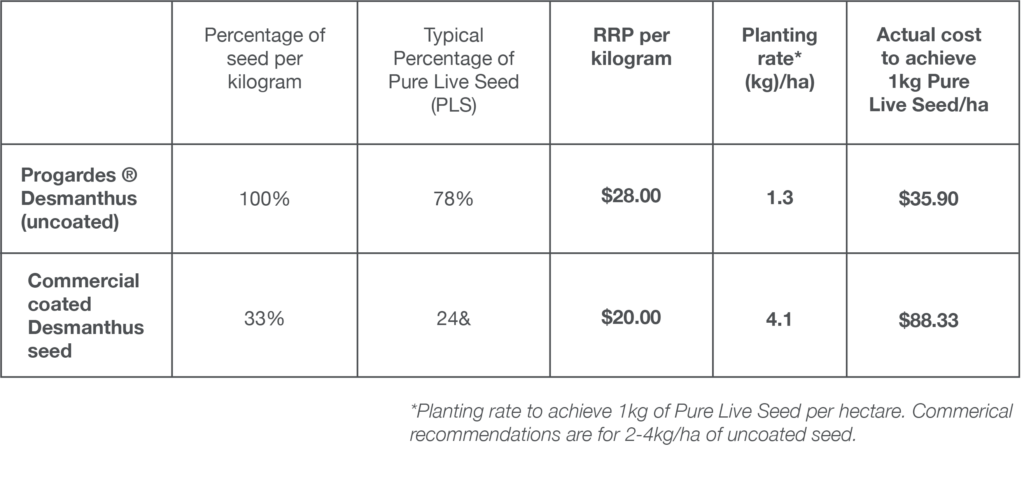Frequently Asked Questions
Grass-only pastures mine nitrogen from the soil and over time, will lose productivity. Soil and animal health suffers as a result. A key aspect contributing to the reduction of pasture productivity in heavy clay soils is the reduced availability of nitrogen and nutrients to feed Buffel or other improved pasture grasses.
Pasture legumes such as Progardes® Desmanthus fix nitrogen from the atmosphere and cycle nutrients through leaf and pod senescence.
Persistent legumes like Progardes® Desmanthus have been proven to maintain pasture productivity and result in 200% more dry matter production compared to non-legume grass pastures. This not only ensures greater productivity but also a reduced need for mechanical renovation. Given mechanical renovation treatment ranges from $120-190/ha and may be required on a 5-10 year cycle to maintain 75% productivity, Progardes® Desmanthus, being capable of extending the inter-mechanical period, could save $12-38/ha per annum in direct costs.
Progardes® Desmanthus is persistent because the main growing crown is below ground level and is therefore able to spring back when the foliage is damaged through grazing or other stresses.
Progardes® Desmanthus foliage is herbaceous and extremely palatable, while the base of the plant is woody, resilient and robust.
Progardes® Desmanthus is tap-rooted and able to access moisture beyond the reach of the root systems of pasture grasses.
Progardes® Desmanthus is non-toxic and does not contain mimosine. No rumen inoculant is required for cattle to tolerate Progardes® Desmanthus.
Progardes® Desmanthus does not require height management.
Progardes® Desmanthus grows in low rainfall areas and is tolerant to frost and heavy grazing.
Progardes® Desmanthus has a high percentage of pure live seed.
Progardes® Desmanthus is well adapted to annual rainfall of 400-1000mm per year, making it suitable for the majority of Australia’s beef-producing country.
Progardes® Desmanthus is compatible with native pastures such as Mitchell, Flinders and Blue grasses as well as introduced pasture species such as Buffel.
Progardes® Desmanthus has been established using a range of methods, including aerial seeding, precision planting, or broadcast with a light harrow. Some producers have also had success with faecal seeding (feeding Progardes® Desmanthus seed to cattle through a molasses supplement or similar and subsequent germination occurs in the dung).
Agrimix will work with you as an individual to tailor an establishment package covering seed bed preparation and seeding rates best suited to your country and enterprise.
Agrimix works with our resellers and with producers on an ongoing basis, trialing and refining paddock preparation and seeding methods on a range of soils and country to ensure establishment success across all of the northern beef-producing regions.
For general advice regarding establishment, refer to the Progardes® Desmanthus Establishment Guide.
To read about how some of our producer partners have prepared and sown their paddocks with Progardes® Desmanthus, you can read producer case studies here.
Progardes® Desmanthus is well adapted to the variable pH levels (slightly acidic to slightly alkaline) of clay-rich soils.
Progardes® Desmanthus has been established using a range of methods, including aerial seeding, precision planting, or broadcast with a light harrow. Some producers have also had success with faecal seeding (feeding Progardes® Desmanthus seed to cattle through a molasses supplement or similar and subsequent germination occurs in the dung).
Agrimix Pastures will work with you as an individual to tailor an establishment package covering seed bed preparation and seeding rates best suited to your country and enterprise.
Agrimix Pastures works with our resellers and with producers on an ongoing basis, trialing and refining paddock preparation and seeding methods on a range of soils and country to ensure establishment success across all of the northern beef-producing regions.
For general advice regarding establishment, refer to the Progardes® Desmanthus Establishment Guide.
To read about how some of our producer partners have prepared and sown their paddocks with Progardes® Desmanthus, you can read producer case studies here.
In many beef-producing areas, cattle lose condition leading into the dry season as the quality and availability of grass pastures declines.
Progardes® Desmanthus increases the pasture production period by providing high-quality forage later into the dry season.
Cattle grazing Progardes® Desmanthus are in better condition due to the high protein and energy levels it provides, allowing them to gain weight faster. Being a legume, Progardes® Desmanthus also fixes nitrogen in the soil, conferring a benefit to the surrounding grass pastures and allowing them to stay healthier for longer when environmental conditions deteriorate.
Kilogram for kilogram, Progardes® Desmanthus delivers more Pure Live Seed for every dollar you spend. Three times more, in fact, so you don’t have to spend a fortune to get a paddock full of productive pasture.

Send us an enquiry, we would love to hear from you and answer any questions.
